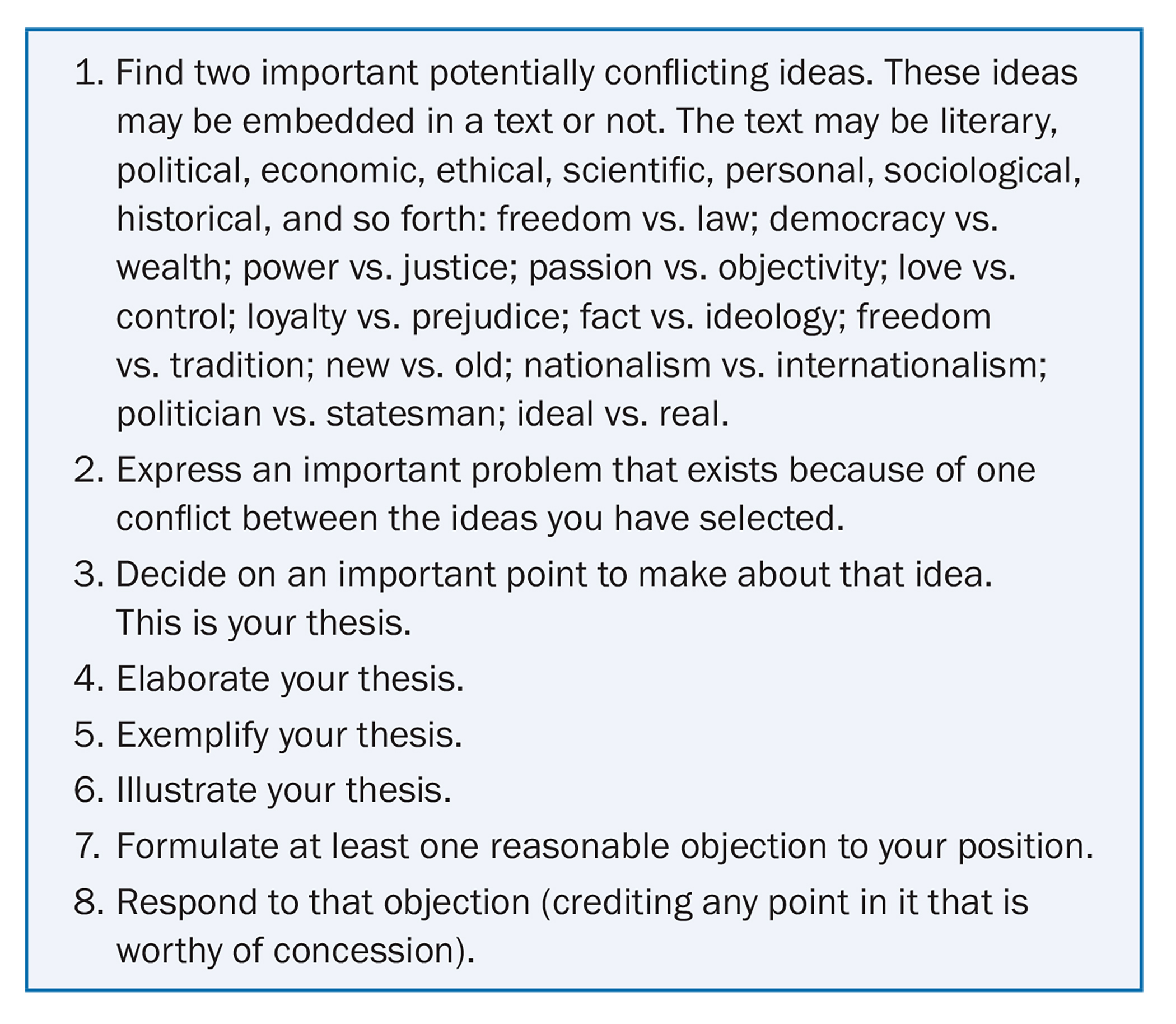Level Two and Beyond: Exploring Conflicting Ideas
In this section we present you with a group of conflicting
ideas, ideas significant in human life. By developing
commentary on the ideas and working out the relationships
between them, you will continue to engage in substantive
writing, but this time you are developing your own thoughts.
In this exercise the focus is on identifying and writing in a disciplined way about ideas that conflict with one another. Use the following structure:
In this exercise the focus is on identifying and writing in a disciplined way about ideas that conflict with one another. Use the following structure:

Consider the following example: Note that in this example we use a reference to
support our thesis.
- Find two important conflicting ideas. The two ideas I will focus on for this example are the ideas of freedom versus law.
- Express an important problem that exists because of one conflict between the ideas you have selected. There is often a conflict between the freedoms people should be allowed and the laws that are passed to protect people who might misuse their freedoms.
- Decide on an important point you want to make about that idea. This is your thesis. It is my belief that the laws and the administration of those laws should allow for the maximum possible individual freedoms, and that all laws that deny people their basic rights should be revoked.
- Elaborate your thesis. In the United States, at present, there seem to be a growing number of laws that deny people some fundamental human right or other. More and more behavior is being criminalized. More and more people are going to prison for acts that don’t harm other people. In many cases the law — penalizing acts that are merely socially disapproved of — are themselves unethical.
- Exemplify your thesis. Consider, for example, the many laws governing consensual adult behaviors. In his book entitled, Ain’t Nobody’s Business if You Do, Peter McWilliams (1996) says: “More than 750,000 people are in jail right now because of something they did that did not physically harm the person or property of another. In addition, more than 3,000,000 people are on parole or probation for consensual crimes. Further, more than 4,000,000 people are arrested each year for doing something that hurts no one but, potentially, themselves.” Among McWilliams’ list of the most popular consensual crimes are: “gambling, recreational drug use, religious and psychologically therapeutic drug use, prostitution, pornography and obscenity, violations of marriage (adultery, fornication, cohabitation, sodomy, bigamy, polygamy), homosexuality, regenerative drug use, unorthodox medical practices (“Quacks!”), unconventional religious practices (“Cults!”), unpopular political views (“Commies!”), suicide and assisted suicide, transvestism, not using safety devices (such as motorcycle helmets and seat belts), public drunkenness, jaywalking, and loitering and vagrancy (as long as they don’t become trespassing or disturbing the peace).” In short, I agree with McWilliams when he says, “You should be allowed to do whatever you want with your own person and property, as long as you don’t physically harm the person or property of a non-consenting other.”
- Illustrate your thesis. To illustrate, consider public nudity, which is against the law. For most people it is upsetting to imagine humans walking around in public without clothes on. Such behavior is considered unethical, and has been made illegal. But imagine what the animal kingdom would look like if all animals, not just humans, were forced to clothe themselves, to keep their private parts covered. Imagine horses and dogs and cats wearing shorts and shirts. Consider making it illegal for animals to go about living an animal life without clothes. The very idea is absurd. The fact is that we get upset if people are publicly nude but not if animals are nude. Yet, we too are animals. Human nudity is no more innately disgusting than any other animal nudity.
- Formulate at least one problem that a reasonable person (who thinks differently from you) might have with your position. A reasonable person opposed to my viewpoint might argue that though many laws violate people’s basic rights, legislators who make the laws in a democratic society are carrying out the views of the majority of the people, that the only way to change this in a democratic society is to educate people about the implications of unethical laws and hope that they will fight for more reasonable ones.
- Respond to that problem (crediting any point in the objection that is worthy of concession).I agree that the only way a democracy can work well is when people are educated and therefore able to think through complex issues. I agree that the people are allowing legislators to speak for them, rather than speaking up for themselves, that people need to become involved in important issues and refuse to support over-zealous law-making. Nevertheless, I also think that the majority often is prone to think in a narrow sociocentric manner and therefore to inadvertently support the violation of human rights. I think that the U.S. Bill of Rights should be expanded to encompass the whole of the U.N. Declaration of Human Rights, and that through education we move toward living in accordance with both of these documents.
Using the example above for reference, complete the activity below: